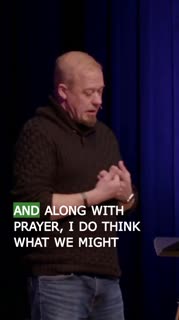Reflecting Christ Through Conduct in Everyday Life
Devotional
Sermon Summary
Bible Study Guide
Sermon Clips
1. "It's going to be called out to witness Christ to others through our conduct. What that means is that we're going to witness in the way that we respond, the way that we act, the way that we conduct ourselves as followers of Jesus with the goal really witness that best resembles the character of Christ. And so Peter, he is going to speak about our witness in three institutions here. The first one is going to be this civic calling. The second one is going to be our career calling. And the last one is going to be this covenant calling, which is covenant of marriage." ([00:07:26] (35 seconds)
)
2. "So how do followers of Jesus, who is this perfect one, Jesus the perfect, right? How do we witness him to an imperfection? How do we witness him to an imperfect institution, right? How through conduct, right, can we witness Jesus through imperfection? And I think that's a really good question. So I think the takeaway from today is where I've landed is rather than like providing some step -by -step like principle from here to here, I think the takeaway we might find ourselves, the most helpful takeaway is to examine not a principle, but rather today a posture, okay? A posture." ([00:09:49] (37 seconds)
)
3. "Being led step by step by the Spirit of God to whatever best approach we have to things like government, to things like our employment, to things like marriage, whatever best bears witness to Jesus to this world. And so here's what I would share once again about this posture over principle. It's if we're looking for an easy answer, I think an easy step, we might be just a little bit disappointed today if that's what we're going for, right? It's not always clear black and white." ([00:10:15] (32 seconds)
)
4. "Navigating witness calls us towards this posture that what it does is it raises others over ourselves. That's how we look at this. It calls us to submit to the desire of Christ to reconcile all people, right? To the work of the gospel rather than to this desire of myself. Now, maybe the question is, does that mean there aren't any practical steps we can take, right? And I don't think that's true. I think we do have some practical ways to gauge our posture." ([00:12:21] (31 seconds)
)
5. "And along with prayer, I do think what we might need to do is ponder just the reality of ways that we can address our posture, right, and kind of check what the posture should look like. And I think what a posture also consists of is how do we contribute to the culture? What does contribution to the culture look like? And so I want us to look at this, witnessing Christ in our conduct, it means contributing to culture." ([00:13:25] (28 seconds)
)
6. "And so witnesses to Christ to others in Peter's context, according to his, is compliance. But let's break that down a little bit. Further, why comply? And the first reason, first reason is I think that at this cultural moment, compliance reflected Jesus the most. If you think about Jesus's interactions when he's addressed with things like government or things like specifically taxes, look what he says when he's addressed this in Mark chapter 12." ([00:17:09] (28 seconds)
)
7. "And so if the role of the Christian just becomes stirring up the pot by making a big scene of imposing their house rules onto that or another, what Peter's recognizing is that attention given to the Christian, with that stirring up, it's not actually doing what God desires of the Christian. Being a blessing. In fact, what it's doing, it's creating a burden on the infrastructure structure of that house." ([00:20:25] (26 seconds)
)
8. "And I think Peter offers a really good way to go about it. Like living peaceful lives as far as of Jesus. It's actually possible we can take the burden that's already on this strain system, we could take that off. Paul says the same thing. He says if possible, so far it depends on you, live peacefully with all. So I felt really convicted about this week." ([00:24:28] (24 seconds)
)
9. "And listen, this is a tough conversation to navigate, especially as we're in this unique role of exiles in this world, in our context here, because there is an obligation to speak into a culture when harm might come from certain radical ideals, especially if those radical ideals are not true. And so I think it's important for us to understand that there's a it's a challenging conversation, and I just think Peter offers, though, a really powerful directive in what we can witness, and its contribution to a culture is compliant." ([00:28:47] (38 seconds)
)
10. "And so the posture here, once again, contribution is compliance, right? To do our jobs for the glory of God in a way that doesn't cause unnecessary distraction to our witness of Christ, to be these benefactions, right? To enhance, not to endanger. But once again, that's Peter's context. And Peter's context is different from ours. And there's times, once again, where our contribution is when possible." ([00:34:05] (30 seconds)
)
Ask a question about this sermon
)
2. "So how do followers of Jesus, who is this perfect one, Jesus the perfect, right? How do we witness him to an imperfection? How do we witness him to an imperfect institution, right? How through conduct, right, can we witness Jesus through imperfection? And I think that's a really good question. So I think the takeaway from today is where I've landed is rather than like providing some step -by -step like principle from here to here, I think the takeaway we might find ourselves, the most helpful takeaway is to examine not a principle, but rather today a posture, okay? A posture." ([00:09:49] (37 seconds)
)
3. "Being led step by step by the Spirit of God to whatever best approach we have to things like government, to things like our employment, to things like marriage, whatever best bears witness to Jesus to this world. And so here's what I would share once again about this posture over principle. It's if we're looking for an easy answer, I think an easy step, we might be just a little bit disappointed today if that's what we're going for, right? It's not always clear black and white." ([00:10:15] (32 seconds)
)
4. "Navigating witness calls us towards this posture that what it does is it raises others over ourselves. That's how we look at this. It calls us to submit to the desire of Christ to reconcile all people, right? To the work of the gospel rather than to this desire of myself. Now, maybe the question is, does that mean there aren't any practical steps we can take, right? And I don't think that's true. I think we do have some practical ways to gauge our posture." ([00:12:21] (31 seconds)
)
5. "And along with prayer, I do think what we might need to do is ponder just the reality of ways that we can address our posture, right, and kind of check what the posture should look like. And I think what a posture also consists of is how do we contribute to the culture? What does contribution to the culture look like? And so I want us to look at this, witnessing Christ in our conduct, it means contributing to culture." ([00:13:25] (28 seconds)
)
6. "And so witnesses to Christ to others in Peter's context, according to his, is compliance. But let's break that down a little bit. Further, why comply? And the first reason, first reason is I think that at this cultural moment, compliance reflected Jesus the most. If you think about Jesus's interactions when he's addressed with things like government or things like specifically taxes, look what he says when he's addressed this in Mark chapter 12." ([00:17:09] (28 seconds)
)
7. "And so if the role of the Christian just becomes stirring up the pot by making a big scene of imposing their house rules onto that or another, what Peter's recognizing is that attention given to the Christian, with that stirring up, it's not actually doing what God desires of the Christian. Being a blessing. In fact, what it's doing, it's creating a burden on the infrastructure structure of that house." ([00:20:25] (26 seconds)
)
8. "And I think Peter offers a really good way to go about it. Like living peaceful lives as far as of Jesus. It's actually possible we can take the burden that's already on this strain system, we could take that off. Paul says the same thing. He says if possible, so far it depends on you, live peacefully with all. So I felt really convicted about this week." ([00:24:28] (24 seconds)
)
9. "And listen, this is a tough conversation to navigate, especially as we're in this unique role of exiles in this world, in our context here, because there is an obligation to speak into a culture when harm might come from certain radical ideals, especially if those radical ideals are not true. And so I think it's important for us to understand that there's a it's a challenging conversation, and I just think Peter offers, though, a really powerful directive in what we can witness, and its contribution to a culture is compliant." ([00:28:47] (38 seconds)
)
10. "And so the posture here, once again, contribution is compliance, right? To do our jobs for the glory of God in a way that doesn't cause unnecessary distraction to our witness of Christ, to be these benefactions, right? To enhance, not to endanger. But once again, that's Peter's context. And Peter's context is different from ours. And there's times, once again, where our contribution is when possible." ([00:34:05] (30 seconds)
)










